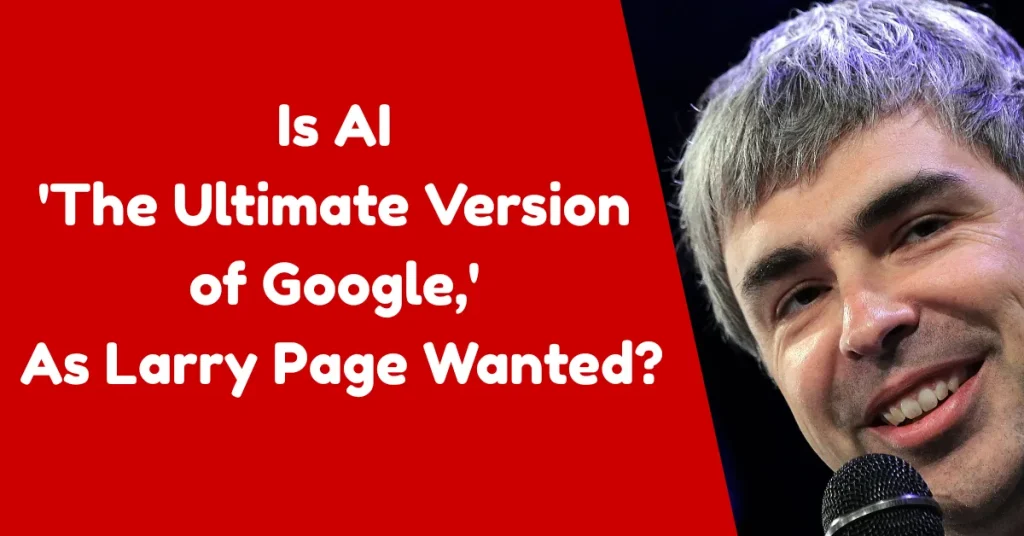Has AI Finally Become the Ultimate Version of Google That Larry Page Envisioned 25 Years Ago?
In 2000, Google co-founder Larry Page made a bold prediction that would reshape the internet forever. “Artificial intelligence would be the ultimate version of Google,” he declared, envisioning a search engine that could understand everything on the web and provide perfect answers to any question. Fast-forward to 2025, and his prophetic vision appears closer to reality than ever before.
With Google’s recent transformation into an AI-first company, we’re witnessing a fundamental shift in how people access information online. But has this evolution fulfilled Page’s original dream, or has it created something entirely different? The answer reveals profound implications for the future of search, the open web, and how we consume information in the digital age.
The Revolutionary Vision Behind Google’s AI Transformation
Larry Page’s Prescient 2000 Prediction
Larry Page’s vision for artificial intelligence wasn’t just wishful thinking—it was a carefully articulated roadmap for Google’s future. In 2000, he explained: “So if we had the ultimate search engine, it would understand everything on the web. It would understand, you know, exactly what you wanted, and it’ll give you the right thing. And that’s obviously artificial intelligence.”
This wasn’t Google’s first foray into AI discussions. As early as June 1999, during Google’s first-ever press conference to announce major funding, Page was already talking about AI, discussing “Google using artificial intelligence and having a million computers someday.”
The ambitious goal was clear: create a search system so intelligent it could eliminate the friction between human questions and accurate answers. Page understood that traditional search—presenting lists of blue links—was merely an intermediate step toward something far more powerful.

From Web Portal to AI Gateway
Google’s journey from web-first to AI-first represents one of the most significant transformations in internet history. Originally conceived as a conduit between web users and web publishers, Google now positions itself as the primary source of information itself.
This shift becomes evident when examining Google’s recent communications. In Alphabet’s second-quarter 2025 financial results, CEO Sundar Pichai’s remarks mentioned AI every couple of lines, while the word “web” wasn’t mentioned at all—not even when discussing search, Google’s core web-based product.
The transformation reflects a fundamental change in philosophy: from helping users navigate to information sources to becoming the information source itself through AI-powered summaries and responses.
Google’s AI-First Evolution: Current State and Impact
AI Overviews Dominate Search Results
Google’s AI Overviews have rapidly become a dominant feature in search results. Recent data shows that AI Overviews now appear in 13% of all Google searches, with 88% targeting informational queries. However, commercial and navigational queries are increasingly featuring these AI-generated summaries as well.
The scope of this transformation is remarkable. According to Pew Research, around one in five Google searches in March 2025 produced an AI summary, with 18% of all Google searches in their study generating AI-powered responses.
The Traffic Impact on Publishers
The rise of AI Overviews has created significant challenges for content publishers and website owners. Research indicates that Google users are less likely to click on result links when visiting search pages with an AI summary compared with those without one.
This trend represents a fundamental shift in web traffic patterns. New data suggests that search clicks fell 30% in the last year, largely attributed to the increased presence of AI Overviews. The implications are profound for businesses, content creators, and the broader web ecosystem that has traditionally relied on search traffic.
Industry-Specific AI Integration
The deployment of AI Overviews varies significantly across different industries:
- Healthcare and Education: These sectors are approaching 90% query coverage with AI Overviews
- E-commerce: Traditional product searches still rarely show AI Overviews, maintaining more conventional search result formats
- News and Media: Mixed implementation depending on query type and recency of information
The Web’s Transformation: From Destination to Data Source
Changing User Behavior Patterns
Google’s AI features are fundamentally altering how people search for and consume information. In major markets like the U.S. and India, AI Overviews is driving over 10% increase in usage of Google for queries that show AI Overviews. This indicates that users are becoming more dependent on AI-generated responses rather than exploring multiple sources.
The behavioral shift extends beyond simple convenience. Users increasingly expect immediate, comprehensive answers rather than embarking on traditional information-gathering journeys across multiple websites. This change reflects Page’s original vision of reducing friction between questions and answers.
The Attribution Challenge
While Google includes attribution links in AI Overviews, the effectiveness of these citations remains questionable. Sometimes attribution links don’t even connect to original sources, instead linking to aggregator sites that have republished content. This creates a complex web of information flow that often obscures original creators and sources.
The challenge intensifies when considering that AI systems can inadvertently promote lower-quality sources or miss important context that only comes from reading full articles and understanding their broader implications.
Advantages and Disadvantages of AI-Powered Search
Benefits for Users
Immediate Access to Information: AI Overviews provide quick, synthesized answers without requiring users to navigate multiple websites.
Improved Query Understanding: Modern AI can interpret complex, conversational queries that traditional keyword-based search struggled with.
Contextual Relevance: AI systems can better understand user intent and provide more targeted responses.
Accessibility: Information becomes more accessible to users with different reading levels or time constraints.
Challenges and Limitations
Accuracy Concerns: AI hallucinations and misinterpretations can spread misinformation more efficiently than traditional search results.
Loss of Context: Summarized information often lacks the nuance and depth available in original sources.
Economic Impact: Reduced website traffic affects the economic viability of content creation and journalism.
Information Homogenization: AI summaries may create echo chambers by presenting similar information regardless of source diversity.
This shift aligns with enterprise trends where Rails accelerates AI integration, powering scalable applications and advanced automation across domains.
The Future of Search: Beyond Larry Page’s Vision
Exploring generative AI in search reminds me of how Ruby on Rails developers today are building AI-powered agents, such as intelligent sales assistants that automate CRM and conversational workflows.
AI Mode and Next-Generation Features
Google continues pushing beyond traditional search with innovations like AI Mode. AI Mode is a new generative AI experiment in Google Search that represents an even more conversational approach to information discovery.
These developments suggest that Google’s interpretation of Page’s “ultimate version” extends far beyond what he originally envisioned. Instead of simply understanding everything on the web, Google now aims to become the primary interface between users and all digital information.
Larry Page’s New AI Ventures
Interestingly, Larry Page himself continues innovating in AI beyond Google. He’s reportedly building a new company called Dynatomics that focuses on applying AI to product manufacturing, assembling a specialized team of AI developers and engineers.
This suggests that even Page recognizes AI’s potential extends far beyond search and information retrieval into physical world applications.
The Open Web’s Uncertain Future
The most critical question facing the internet today is whether the open web can survive in an AI-dominated search landscape. If users increasingly receive information through AI summaries rather than visiting original sources, what happens to the websites, blogs, and content creators who generate that information?
This creates a potential feedback loop problem: as original content creators lose traffic and revenue, they may produce less content, ultimately leaving AI systems with fewer high-quality sources to summarize. The long-term sustainability of this model remains unclear.
Comparison: Traditional Search vs. AI-Powered Search
Aspect | Traditional Search | AI-Powered Search |
|---|---|---|
Information Format | List of links to sources | Synthesized summaries with citations |
User Interaction | Multiple clicks and site visits | Single interaction for basic queries |
Source Attribution | Clear source identification | Mixed attribution effectiveness |
Content Depth | Full context from original sources | Summarized key points |
Publisher Benefits | Direct traffic to websites | Reduced click-through rates |
Information Accuracy | User evaluates multiple sources | Dependent on AI interpretation |
Discovery Process | Serendipitous browsing | Targeted answer delivery |
Industry Impact and Implications
Content Publishers and SEO Strategy
The rise of AI-powered search requires fundamental changes in content strategy:
- Featured Snippet Optimization: Creating content specifically designed for AI extraction
- Entity-Based SEO: Focusing on semantic understanding rather than keyword density
- Original Research: Producing unique data and insights that AI systems must reference
- Direct Audience Building: Developing channels independent of search traffic
Economic Implications for the Web Economy
The transformation affects various stakeholders differently:
Winners: Users seeking quick answers, Google’s advertising revenue from AI-integrated ads
Losers: Traditional content publishers, affiliate marketers, information aggregators
Uncertain: Original content creators, news organizations, educational websites
Expert Perspectives and Industry Response
Search Engine Optimization Evolution
SEO professionals are adapting strategies to remain visible in an AI-dominated search landscape. Key developments include:
- Optimizing for AI Overview inclusion rather than traditional rankings
- Creating comprehensive, authoritative content that AI systems prefer to cite
- Building direct relationships with audiences to reduce search dependency
- Focusing on topics and queries less likely to generate AI summaries
Publisher Adaptation Strategies
Leading publishers are experimenting with various approaches:
- Creating AI-resistant content formats (interactive tools, personalized experiences)
- Developing direct subscription models independent of search traffic
- Partnering with AI companies for content licensing agreements
- Investing in original reporting and unique perspectives
FAQs About AI and Google’s Evolution
The Paradox of Larry Page’s Vision
Larry Page’s 2000 prediction about AI becoming the “ultimate version of Google” has largely come to fruition, but perhaps not in the way he originally intended. While today’s AI-powered search provides more direct, immediate answers to user queries, it has also fundamentally altered the relationship between users and the open web.
The current evolution represents both the fulfillment and transformation of Page’s vision. Google has indeed created a system that “understands everything on the web” and can “give you the right thing,” but this capability has shifted Google’s role from information organizer to information gatekeeper.
As we move forward, the critical challenge lies in balancing the undeniable benefits of AI-powered search—immediate access to synthesized information—with the preservation of a diverse, economically sustainable web ecosystem. The future of information discovery will likely depend on finding solutions that satisfy users’ desire for quick answers while maintaining the rich, diverse content landscape that makes those answers possible.
Whether this represents the ultimate realization of Larry Page’s vision or an unintended consequence of it may depend on how successfully the industry addresses these fundamental tensions in the coming years. The AI revolution in search has only just begun, and its full implications for how we access, create, and value information are still unfolding.
The transformation of Google from web portal to AI-powered answer engine marks one of the most significant shifts in internet history, fundamentally changing not just how we search, but how we think about information itself.







